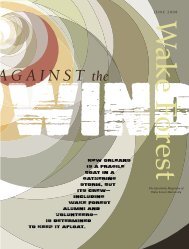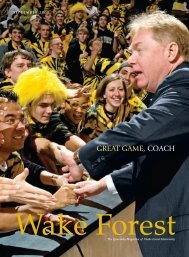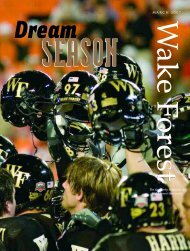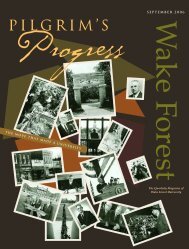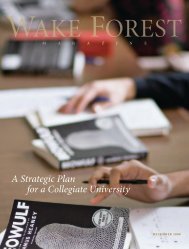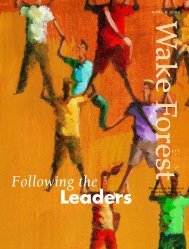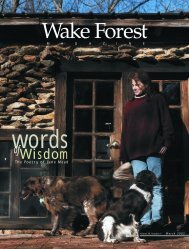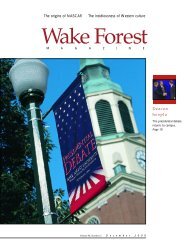Wake Forest Magazine September 2003 - Past Issues - Wake Forest ...
Wake Forest Magazine September 2003 - Past Issues - Wake Forest ...
Wake Forest Magazine September 2003 - Past Issues - Wake Forest ...
Create successful ePaper yourself
Turn your PDF publications into a flip-book with our unique Google optimized e-Paper software.
Faux Faulkner‘Three Bears’ parody is just rightMichael Edens (’83) wrote a wordy parody of “Goldilocks and the Three Bears”that was neither too serious nor too silly, but just right—and judges selectedhis spoof as the winner of the 14th annual Faux Faulkner contest held in July.Edens said his idea for “Appendix:The Sound and the Furry,” hit him in a flash. Heimagined how William Faulkner, whose The Bear is a staple of high school literaturecourses, would handle “two more bears.”He composed the story quickly. “It only took me a couple of days, maybe an houra crack each time,” he said. “I just wrote about half of it, and then half and just fiddledwith it.” He tossed the story into a drawer and forgot about it for a couple ofyears.Then, he submitted the piece to a panel of celebrity writers who chose it asthe year’s best parody of the style, if not the substance, of Nobel laureate WilliamFaulkner, whose stream-of-consciousness tales of complex Southern souls have wonacclaim the world over.“Goldilocks,” he wrote. “Slim blond avatar of unreasoning womankind: who lovednot the porridge itself, nor even the act of reiving it from whatever unknown animalmight have been responsible for its preparation.” And so his Faulkneresque sentencecontinues unabated, another one-hundred thirty-three words, commonplace andarcane, through the ursine world of domesticity, until it winds down to this: “…and Ican no longer remember the subject of my sentence.”“That’s the one everyone remarks about,” Edens said.Larry Wells of Oxford, Mississippi, is founder and coordinator of the Faux Faulknercontest, along with his wife, Dean Faulkner Wells, the author’s niece. He said Edens’parody works because it reflects the vocabulary and cadence of Faulkner’s own fiction.The 43-year-old Edens lives in Earlysville,Virginia, and makes his living as awordsmith. He is supervisor of technical publications for Northrop Grumman’sSperry Marine Division in Charlottesville. He spent a dozen years in Los Angeles,where he said he performed standup comedy, wrote a half-hour screenplay for anundistributed film, and appeared on the brainy “Win Ben Stein’s Money”—and won.He has been a Faulkner fan since he was required to read The Sound and the Furytwenty years ago for a freshman literature seminar at <strong>Wake</strong> <strong>Forest</strong>. “It’s not just myfavorite Faulkner novel. It’s my favorite novel of all time,” Edens said.He said he admires the universal quality of Faulkner’s work. “I really feel likeFaulkner speaks for the South, for America and for the world, that he’s on all three ofthose pages,” Edens said. “To me, it’s more the depth of knowledge of humanitybehind the words.The words are kind of what makes him easy to parody.You canthrow in avatar, ratiocination and reivings.”Edens—whose story was selected by judges including George Plimpton, ArthurSchlesinger Jr. and John Berendt—read his entry (excerpted at right) during the 30thFaulkner and Yoknapatawpha Conference in Oxford, Mississippi.Reprinted with permission from The Associated Press60 <strong>Wake</strong> <strong>Forest</strong> <strong>Magazine</strong>




